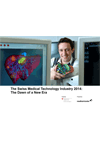 This is the fourth full edition of the Swiss Medical Technology Industry (SMTI) Report first initiated in 2006. This issue is based on growing industry participation - over 340 firms contributed their insight and facts to this report. Over the years we observed a fundamental shift in business behavior within the industry from soaring double digit growth to single digit growth in today's consolidating world. The stagnation, however, has ceased and firms are using the momentum to recuperate and initiate the next leap forward in their growth ambitions beyond bundled offerings. Thus, we foresee a new medtech era rising which embraces holistic integration. Holistic integration refers to the ability of a company to capture a whole area of healthcare, such as a disease, and owning all aspects of care from supplies to services to hospital suits.
This is the fourth full edition of the Swiss Medical Technology Industry (SMTI) Report first initiated in 2006. This issue is based on growing industry participation - over 340 firms contributed their insight and facts to this report. Over the years we observed a fundamental shift in business behavior within the industry from soaring double digit growth to single digit growth in today's consolidating world. The stagnation, however, has ceased and firms are using the momentum to recuperate and initiate the next leap forward in their growth ambitions beyond bundled offerings. Thus, we foresee a new medtech era rising which embraces holistic integration. Holistic integration refers to the ability of a company to capture a whole area of healthcare, such as a disease, and owning all aspects of care from supplies to services to hospital suits.
Download: The Swiss Medical Technology Industry 2014: The Dawn of a New Era (.pdf, 3.039 KB).